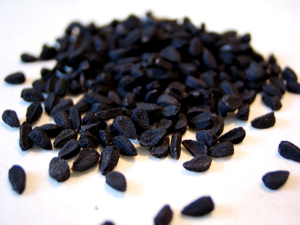Nigella seeds are called black cumin seeds or onion seeds.

The first time I saw these tiny black seeds was when my mother made bhatura (thick fried puri) and pressed some nigella seeds onto the bhatura before adding it to the wok of boiling oil. Against the whiteness of the puri, the black seeds looked dramatic and appealing. I use kalonji in a variation of potato subzi.
However, I must admit I always thought it was a spice and never thought it had medicinal properties till the time I came to know otherwise. Nigella seeds are loaded with vitamins, amino acids, dietary fibre, proteins and fatty acids like linolenic and oleic acids, volatile oils, alkaloids, iron, sodium, potassium and calcium.
- Keeps a check on diabetes
- Eases joint paints
- Aids weight loss
- Relieves head aches
- Controls blood pressure
- Stimulates hair growth and controls hair loss (and that is the reason why I use it in my hair oil)
- Keeps skin youthful and radiant
- Acts as immunity enhancer
- Increases memory power and retention
People swallow kalonji seeds with warm water on empty stomach first thing in the morning to aid weight loss. Some also drink kalonji oil.
I boil curry leaves and kalonji in black sesame oil for 15 mins, strain it once cool and store it in a jar for future use.
As is the case with every spice, one should use kalonji in moderation, as it is a powerful spice and frequent heavy dosage can lead to bleeding disorders. Also, if you are pregnant, do consult with your doctor before using it for medicinal benefits.


Thats wonderful anshu.. I have heard of kalonji in recipes but this in water is first time. Does it really aid in weight loss?
Deepa, even I didn’t know about it until recently. Yes, it has helped many people. But, take it in minimum qty. There are many other weight loss remedies, will send you some soon.
Oh wow Didnt know it had so many medicinal properties. I have always been adding this to my pooris. Glad you have listed these properties, shows our indian spices are filled with goodness and health advantages.
Glad you have been using it, Ramya! All spices are full of goodness and wellness, the thing is our ancestors knew about it. It’s just that over the years, though we continued to use these spices, we forgot the benefits of using them.
Very informative Anshu. I was not aware of this seed!
North Indians use it frequently, Shilpa! Do try it with bhatura or poori.